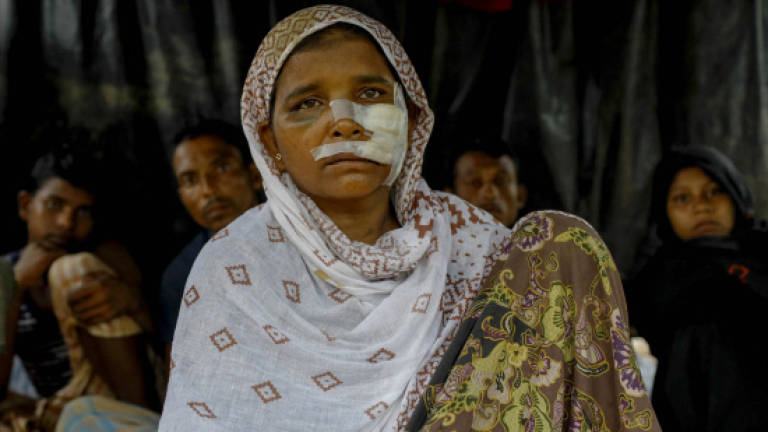Newly-released report details suffering of Rohingya in Myanmar

BANGKOK: Ko Mratt, a Rohingya from Myanmar, has related to researchers that he lost almost his entire family in a killing spree allegedly committed by Myanmar soldiers last year.
The former resident of Maungdaw township said he lost his younger sister who was then delivering a child, another younger sister who was seven months pregnant, his four-year-old son and a five-year-old nephew on Oct 14.
They were all shot to death, he said to researchers from the Burma Human Rights Network (BHRN) which has released a report on the alleged persecution of Muslims in Myanmar, titled "Persecution of Muslims In Burma BHRN Report".
Ko said in his account, in the report that he also saw his 70-year-old mother murdered, wife shot, and their house burned down in the killing spree.
Shortly after the harrowing incident, he and his badly injured wife fled the township to Cox's Bazaar in Bangladesh where he managed to get a doctor to treat the gunshot wound suffered by his wife.
His wife survived the ordeal. The doctor retrieved fragments of the bullets, but 18 more of the splinters remain inside her.
The report draws on more than 350 interviews over a period of eight months from March 2016, with testimonies collected from individuals in more than 46 towns and villages across Myanmar.
The report, which was released Tuesday by its founder and executive director, Kyaw Win, here, details compelling evidence on what it said was the ongoing systematic persecution, which was not restricted to the Rohingya but encompassed other Muslims in Myanmar as well.
The report was released as another killing spree allegedly erupted in Rakhine State which, according to international aid organisations, has claimed hundreds of lives including of women and children.
The violence, which has been blamed on the "Tatmadaw" or Myanmar military, has also forced more than 100,000 Rohingya to flee their torched houses.
The 100-page report also recounted the experience of another Rohingya man, Ye Thu, 40, also from the Maungdaw township, who was caught in the violence along with his three brothers and two children and had to flee.
He said that at around 3.30am on Nov 13, their village came under fire from helicopter gunships and an unknown ground-level source.
The next morning, he saw a large deployment of soldiers approaching the village and fled to nearby bushes.
Ye said that from his hideout, he saw the Tatmadaws torching almost all the 450 homes in the village, at times allegedly using rocket-propelled weapons with an incendiary device.
He also claimed to have witnessed soldiers arresting and killing the villagers, among them his nephew, cousin, and daughter-in-law.
Besides documenting testimonies detailing the human cost suffered by the Rohingya from military operations, BHRN also recorded multiple instances in which Muslims of all ethnicity were refused ID cards, also known as the National Registration Card (NRC).
Muslims, according to the organisation, faced a multitude of problems when applying for the NRC, including a flat-out denial and the need to furnish an extensive and difficult-to-obtain documentation on family lineage dating back to before 1824.
The authorities, it said, had also persistently blocked the rebuilding of mosques and madrasah that had been damaged, destroyed or sealed in recent years.
"In Myanmar, the refusal by authorities to allow the rebuilding of destroyed mosques and the bar on Muslims returning to their places of worship appears to be part of a calculated strategy to deny religious expression for Muslims," said BHRN.
It claimed that five years after violence broke out between extremist Buddhists and Muslims in western Myanmar, conditions for Muslims (including non-Rohingya) throughout the country have worsened. — Bernama